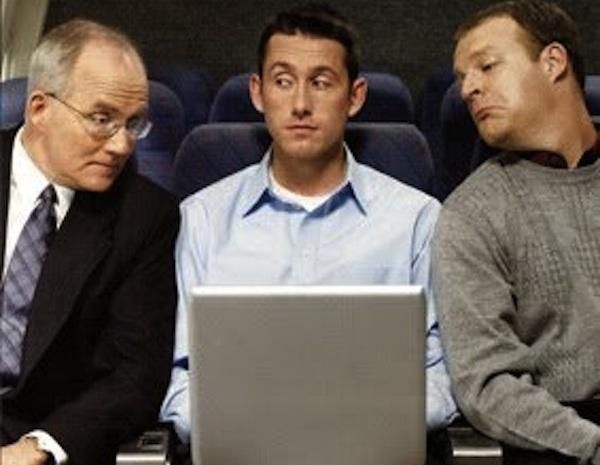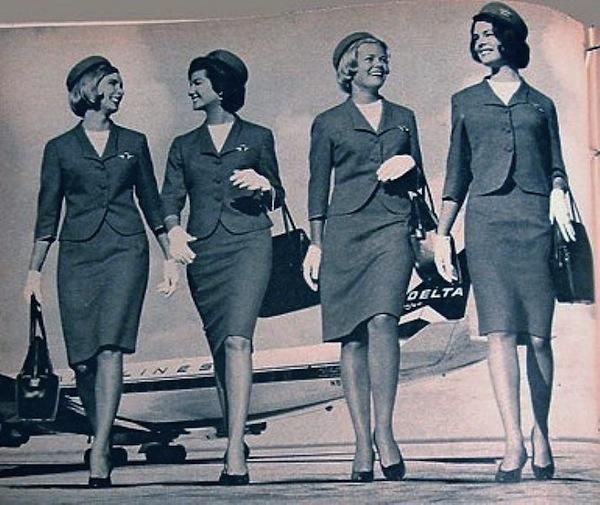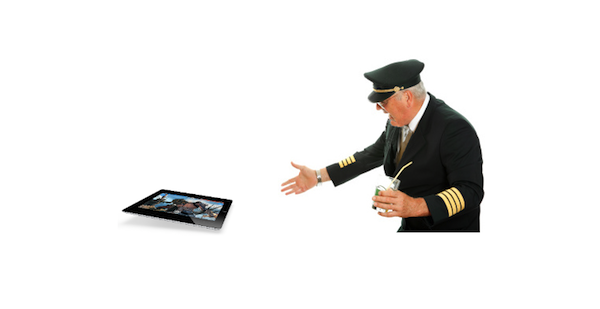I've been doing some flying recently. Not the fun kind, though, with a fighter jet or bungee cord or wax wings. Rather, I've been cris-crossing the country the dull, pedestrian way, packed like a sardine into a metal tube with hundreds of similarly compressed commuters, all of us sneezing on each other, grudgingly eating dry sandwiches for $8 apiece, and wondering what sort of life decisions have landed us is coach class for a six-hour flight.
Not that I'm bitter or anything.
The one thing that keeps me sane during air travel (other than comedian Louis C.K.'s hilarious reminder that "you're on a CHAIR in the SKY!" ) is the escape offered by books, magazines, and movies. No matter how pronounced the aroma of the Indian food brought aboard by the guy in the neighboring row, or the constant arm-rest encroachment of the woman next to me, I can usually count on a paperback novel or a few hours of mindless Hollywood tripe to transport me to a more-tolerable world.
The problem: the medium by which that content is delivered is becoming increasingly electronic. Instead of a bag full of books and magazines, travelers are more often bringing along just a Kindle loaded with what they want to read. Instead of relying on the often-pricey onboard movie and TV selections, they sync a few episodes of Dexter to their iPads, plug in some headphones, and hope that any over-the-shoulder eavesdropper will be more grossed-out than compelled.
“Ohh, awesome spatter pattern on that head shot.”
In so many ways, the portable electronic versions of these entertainment options are much more convenient than their older counterparts. Mobile device manufacturers realized this a long time ago, in the age of the dumbphone. Reasoning that even if people couldn't make phone calls from 35,000 feet, they'd still maybe enjoy playing the occasional game of Snake or indulging in a text adventure, OEMs started building an "offline mode" into their devices. This allowed the user to disable the mobile phone's radio while still keeping the rest of the device active, preventing any forseeeable in-flight interference.
I remember the first phones with this feature rolling out around 2003, the new setting then considered enough of an innovation that it warranted on-box branding on some phones. Back then, as a frequent user of third-party Java apps on my mobile phone, as well as a frequent flier, I considered the new "Airplane Mode" a genius move. I could use my phone all I wanted, at any time during a flight, as long as the one component which could *conceivably * cause a problem -the radio- was turned off. Brilliant!
Then those flight attendants had to come along and ruin all my fun.
“Just wait until we tell them to turn off their wristwatches! It’ll be a hoot!”
On my most recent flight, as on almost every flight I've taken since Airplane Mode was introduced, there came a stern warning from the flight crew. It went something like, "ladies and gentlemen, for our takeoff and ascent, we need all electronic devices -anything with an on/off switch- in the 'OFF' position. 'Airplane Mode' is not off; we do need those devices switched *off * for this portion of the flight." A similar announcement was made prior to descent.
The result: in the U.S., the twenty minutes or so that bookend every flight -takeoff and landing- are no-electronics times. So anyone relying on an e-reader or an iPad to keep his or her mind from these "eventful" portions of the flight is stuck reading United Airlines Today or perusing the safety brochure outlining the best ways to avoid flaming death. I'm not afraid of flying, but for people who are, takeoff and landing are pretty stressful times, where a mental escape isn't just welcome, but sometimes necessary.
The easy answer, for traditionalists and realists alike, is evident: when you're flying, just bring old-style books and magazines. Well, someday I'll write an editorial about how wrong-headed I find the resistance to e-readers, but here I'll just say that there's no better example of the convenience of electronic books than air travel. It's a use case custom-written for the medium. I'd go so far as to say that air travel is a big part of the reason e-readers -and their tablet siblings- exist.
So why do airlines hate them?
“GET OFF MY PLANE! I’m drinking for some reason!”
I went to some air-travel forums to find the answer, and learned that the debate surrounding whether passenger electronics are hazardous to flight is an old and contentious one. Forum members were almost universally keen to avoid this ancient and apparently fruitless conversation (at a site called FlyerTalk, user LowlyDLsilver remarked that "this thread should be renamed 'The electronics hamster wheel' — as it will go round and round endlessly and never get anywhere"), but that didn't stop some interesting exchanges from popping up.
In fact, the FlyerTalk forum (link at bottom) was the site with the best and most recent conversation along these lines, where compelling arguments were advanced both for and against the allowance of "airplane mode" during all phases of flight. Here's the best from each side.
Yes: Use Your Electronics, But Use Airplane Mode
Fortunately, I found very few people on the internet advocating that passengers actively defy the flight crew. That's an attitude I share: you may disagree with the regulations, but you have to follow them. You may have noticed that flight crews tend to be pretty sensitive about the rules; that's because those rules are FAA regulations in the United States, not meaningless decrees from airline boardrooms. Ignore them at your own peril. But if you delay my flight because the Feds had to come haul your noncompliant butt off our plane for refusing to stop playing Angry Birds, I will fight you. That's no lie.
The birds will forgive you. I won’t.
Of the people who found the "airplane mode doesn't count" attitude foolish, the arguments were predictable. The logic goes like this: Airplane Mode exists to serve a purpose, which is disabling the element of a mobile device with the highest probability for causing interference- its radio. By not permitting use of this mode below 10,000 feet, a mode custom-built for this use case, the airlines and the FAA are being paranoid.
My brother, a pilot by profession, is one of those who doesn't see the utility in banning mobile device use, as long as Airplane Mode is enabled. While he admits that he's "not one hundred-percent sure of the 1's & 0's," he "personally think[s] it's useless ... why don't [the airlines] make you turn off digital watches or hearing aids?"
FlyerTalk user geoko makes a similar point with regard to e-paper based readers like the Kindle:
I find it quite amusing, when [flight attendants ask] for Kindles to be turned off. Due to the ePaper display, it turns it self off once you are done "flipping the page." After that the Kindle is a glorified book. Are they going to ban books and magazines too? What about the Airline supplied magazine?
Drop that copy of SkyMall … right now.
To me, the more interesting part of this argument -that the rule is stupid and should be changed- is in the psychology behind passengers who don't agree with the regs. User dtremit makes the point that airlines experiencing passenger resistance to these rules have only themselves to blame:
I don't think it's that people think they're smarter — maybe some do — but that people think they're being lied to. The airline industry has a pretty good track record of making arbitrary rules and then using dubious explanations to justify them. I think they have probably brought this skepticism on themselves. The rules haven't changed in years — heck, they're still making announcements about being allowed to use "cell phones, PDAs, and pagers" after touchdown.
Common sense says that if an iPad can be certified for use in flight by pilots on AS, DL, and other carriers, that same device sitting locked and in airplane mode in a seatback pocket isn't likely to be a safety risk. By not acknowledging the obvious differences between devices, I think the carriers are begging to be challenged on this.
No: Keep That Thing Off, Or Take The Damn Train
The arguments advanced against use of electronic devices below 10,000 feet, even in Airplane Mode, are just as interesting. That's surprising, because they're rooted almost completely in safety and in a "these are the rules and you must follow them" mentality that I typically find infuriating. But there's something about hurtling through the atmosphere in an aluminum tube at 500mph that makes safety discussions ... more interesting, somehow.
In retrospect, Bob realized, playing that extra round of Sparkle probably wasn’t necessary.
User ArizonaGuy posited that the rules against electronic devices in low-altitude flight exist because of their potential for distraction, rather than radio emissions:
Along with the possible EM interference (let's not debate this ad infinitum please) there's the safety issue — if you're paying attention to your Kindle at the time when incidents are most likely to occur (taxi, takeoff, landing) and not paying attention to your environment or possible crew instructions, the risk factor of personal injury or death increases. That's my opinion on the matter.
And returning to the EM issue, user *blue47 * remarks that while he doesn't know whether his phone would cause interference, not knowing is reason enough to make assurance double-sure:
I do have a degree in electrical engineering with a signal processing emphasis and worked for years trying to detect spurious emissions from enemy forces. I will tell you that my cell phone does not interfere with radios in my house, and that, theoretically, the odds of it doing so are very, very small. Even more remote would be the chance that the interference would cause a crash. However, I have a watch winder gadget that trashes my radio reception. Therefore, I think I have the solution. Have TSA ban all electronics from the flight, or test each item for emissions at the security check point. Then we would all be safer (and very angry).
Or, you can shut it off and stop being a rebel without a cause.
“I don’t turn my phone off for nobody, jack.”
In all, I think user *dcpatti * states the anti-gadget case most eloquently:
The odds are small that most common, modern devices would be problematic. Older, less common ones, are another story. Do we trust the passengers to know which devices are safe and which aren't, and act accordingly? The same passengers who don't always know that you can't take a full-sized shampoo through security or fit a tuba in the overhead bin? Or do we rely on the [flight attendants] to memorize every make and model of electronic anything so that I can play Bejeweled for an extra 11 minutes? How about we all just behave and comply with what is, fundamentally, a very reasonable request?
Don't Rock The Plane
The thing is this: fundamentally, in our present-day world, the rule makes a degree of sense. The electronic frontier is advancing at a rapid pace, and it's nearly impossible -even for those of us in the tech news business- to keep abreast of all new developments in technology. It is impossible for a flight attendant to do so. It's conceivable that somewhere in the vast mobile-tech world, passenger-owned devices exist which could cause some degree of trouble to large aircraft navigation.
But technology is the future. More precisely, it's the present , but the future will see an even-more accelerated elimination of traditional content-consumption media like books and newspapers. Someday, tablets, phablets, and e-readers are all passengers are going to carry on a plane, with no analog backups. And they're not going to want to be told they can't read until the plane breaks 10,000 feet.
That's why now is the time to re-evaluate this restriction. According to the Chicago Tribune, the airlines were the driving force behind getting the restriction implemented in the first place way back in 1993. If they want to stay competitive, they'll have to be the driving force behind repealing it, now that the world has changed around them.
Forum discussion source: FlyerTalk
Airline regulation information source: Chicago Tribune








